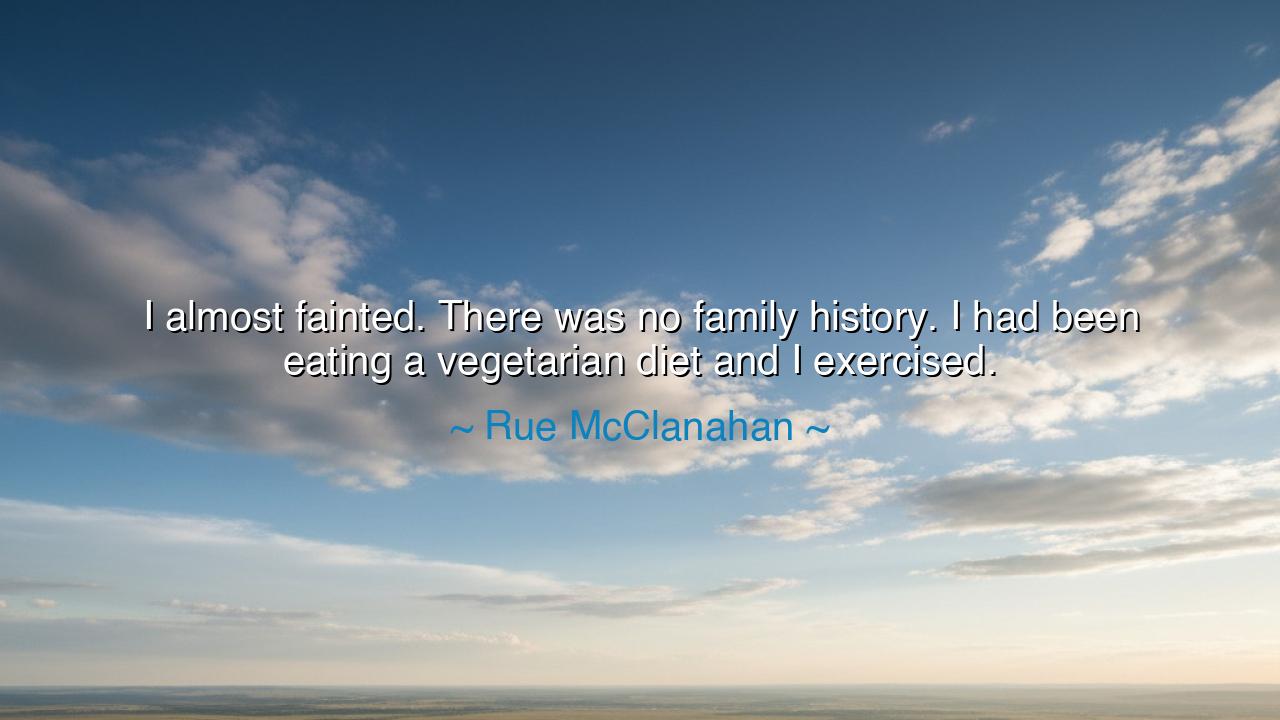
I almost fainted. There was no family history. I had been eating
I almost fainted. There was no family history. I had been eating a vegetarian diet and I exercised.






"I almost fainted. There was no family history. I had been eating a vegetarian diet and I exercised." These words, spoken by Rue McClanahan, stir the soul, for they remind us of the fragility and unpredictability of life. Here, in this moment of vulnerability, McClanahan reveals the mystery of health, that despite our best efforts to control our bodies through diet and exercise, fate can still strike without warning. It is a lesson in the inherent uncertainty of existence, a reminder that we are not masters of our fate, but humble travelers on a journey whose end is known only to the universe.
What does it mean to be healthy? In an age where we have been taught to believe that if we adhere to the rules—eating the right foods, exercising, avoiding harmful habits—our bodies will remain invincible, McClanahan's words shatter that illusion. She had followed the prescribed path, the path that many of us believe will safeguard us from harm. She ate a vegetarian diet, a choice many herald as a symbol of health, and she exercised, honoring the vessel that carries her through this world. Yet, in that moment of almost fainting, she was faced with the stark realization that no amount of control can shield us from the unpredictable nature of life. Health, it seems, is not a fortress built on willpower alone, but a delicate balance, fragile as the finest thread.
Consider, if you will, the story of the great Alexander the Great, a man whose conquests were legendary, whose ambition knew no bounds. He believed himself invincible, having led his army to triumph across continents. Yet, at the height of his power, he succumbed to a fever, a sickness that struck him down in an instant, leaving his empire to fragment into pieces. He had conquered the world, but he could not conquer death. This tragic end serves as a profound lesson: that no matter how much we believe in our own strength, we remain subject to forces beyond our understanding. Health, like life itself, is a gift we cannot fully control.
McClanahan's words bring us to the heart of humility. In her moment of weakness, she reminds us that despite our best intentions and efforts, life will often surprise us with its uncertainty. We may not always know why things happen, nor can we always anticipate the forces at play within our bodies. This is not to say that we should abandon our pursuit of health and well-being, but rather, it calls for an acceptance of our vulnerability. We must understand that strength does not lie in perfect control, but in the ability to continue forward, to rise again, even when we are struck by the unexpected.
The lesson here, then, is one of balance and acceptance. While we should honor our bodies, treating them with care and respect, we must also acknowledge that there are forces at play in this world that we cannot always control. There are genetics, there are circumstances, and there are the simple mysteries of life that defy explanation. To live in this world is to dance with the unknown. Our best efforts, no matter how disciplined, cannot guarantee the outcome. It is, in fact, the uncertainty that makes life precious. Without this vulnerability, we would have no need for gratitude, for growth, or for the strength to face adversity.
Take, for example, the ancient philosophers, who taught that the key to a virtuous life was not to seek perfection, but to seek balance. They knew that the journey of life was uncertain, and that we must cultivate a mindset that allows us to accept whatever comes. The wise Socrates spoke of the importance of self-examination, not as a means to achieve perfection, but to understand our place in the grand scheme of things, to embrace our flaws, and to learn from them. Like Socrates, we too must accept that our health, while important, is not something we can perfectly control. And in that acceptance, we find the peace to live fully, knowing that each breath is a gift.
And so, as we walk upon this earth, let us remember Rue McClanahan's words as a reminder of our shared humanity. Let us strive for health, not with the expectation of invincibility, but with the understanding that life—in all its beauty and fragility—is unpredictable. Let us care for our bodies, feed them well, move them in joy, but let us also embrace the lessons taught by the inevitable uncertainties. In the end, it is not the perfect control of our bodies that defines us, but the way we rise after we are struck by the forces we cannot understand. And in that rising, we find our true strength.






AAdministratorAdministrator
Welcome, honored guests. Please leave a comment, we will respond soon